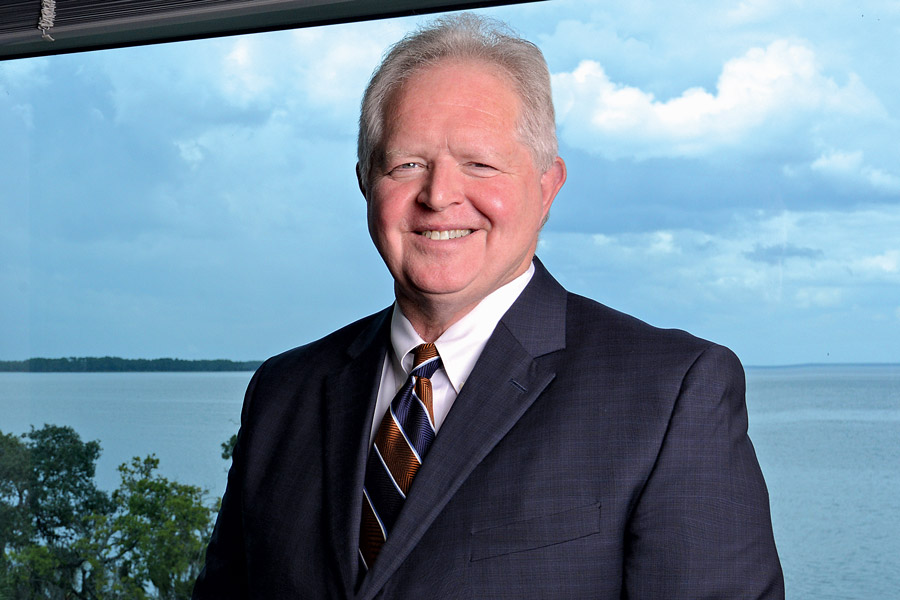
Randy Hanna is excited as he talks about the future of Florida State University Panama City.
In his inimitably go-getter style, the dean of FSU Panama City is using his wide-ranging, 30-plus years of experience as a lawyer, educator, business manager/consultant and administrator to craft new alliances between education, business and government.
The collaborations offer benefits for all of Northwest Florida. Employers get a pipeline to skilled workers and Florida State students get more options for good jobs.
“That’s a huge part of FSU Panama City and my job,” said Hanna, who recently celebrated his first anniversary as dean. “This campus is here to serve the local area. To do that, you have to be engaged with all segments of the community.”
Hanna, who brings to the job an infectious enthusiasm and keen focus on results, leads a vision to position FSU Panama City for the future. Part of that vision uses sector strategies — partnerships between leaders in the community, education, business, government and economic development — to align public and private efforts to build a skilled workforce and meet the needs of employers.
Those needs are ramping up fast. Northwest Florida’s hot economy is projected to add nearly 60,000 jobs over the next decade, according to the Florida Chamber of Commerce, and job growth is expected to jump more than 35 percent.
Hanna already sees notable examples of that growth.
GKN Aerospace, a U.K.-based aircraft manufacturer with 60 locations around the world, has built a new manufacturing plant in Bay County with 170 jobs that pay an average of $63,000 a year.
The U.S. Air Force is creating 1,600 jobs at Tyndall Air Force Base in Panama City with the construction of a $250 million facility for a new wing of unmanned aircraft called the MQ-9 Reaper. The new military operation promises to boost the region’s economy and offer lots of job opportunities for skilled workers.
“I’m excited about the future here with the expanding manufacturing and technology sectors in our economy,” Hanna said. “We want to make sure FSU Panama City offers academic programs that meet the needs of students who want to stay or move here, as well as the employers in this area.”
Goals for FSUPC’s future
On Dec. 1, 2016, Hanna was named dean of FSUPC after serving in an interim role for four months. He had four main goals: expand academic programs, boost enrollment, enhance campus life and forge a closer relationship with the community.
Hanna feels good about progress in those areas. The university signed agreements with Gulf Coast State College, Northwest Florida State College and Pensacola State College to streamline the process for graduates of those schools to enroll at FSUPC.
He partnered with Gulf Coast State College, located across the street, to combine student activities and create a more vibrant campus. Last semester, the university opened a new facility, the John and Gail Robbins Center for Academic Excellence and Innovation, and it quickly became the hub of campus.
FSUPC is reaching out to the community in new ways beyond academics. For the first time in many years, the university is hosting popular Opening Nights events. A recent concert featured Grammy-nominated musician Sierra Hull, and vocalist Bria Skonberg will perform Feb. 24.
The university has invested in new academic programs in commercial entrepreneurship and hospitality management and hired new faculty to bolster business offerings at the FSUPC campus.
Now, FSUPC is making plans to start a master’s degree program in systems engineering designed to produce more engineers for U.S. Navy jobs. Other engineering programs are under consideration.
Hanna wants to be proactive with academic offerings.
“There’s competition for these students and students want to come to FSU,” Hanna said. “We need to have the right programs for them.”
Eclectic Experience
Hanna brings a varied background to lead FSUPC’s future. He earned a law degree from Florida State in 1983 and, while he made a living as an attorney, added an MBA in 2004 and a doctorate in education in 2014.
That eclectic experience — including service as chancellor of the Florida College System, a trustee on university boards and a job working with government officials and educators from India, Ukraine, Egypt and the Philippines on higher education-related assignments — has taught him important lessons.
Hanna said he knows students are eager to learn, and he’s excited to see how they interact with professors.
He knows an increasing number of first-generation students are enrolling at FSUPC and at higher education institutions nationwide, and he feels an obligation to help them succeed.
He knows there’s a direct correlation between intergenerational poverty and lack of higher education, and he wants to offer academic opportunities to those students.
And the one thing he knows for sure, based in part on his own life, is the great value of a degree from FSU.
“Florida State University is one of the top public universities in the country,” Hanna said. “I tell our students that they will leave here with greater critical thinking skills and understand the importance of being active participants in their community. Their FSU degree will be worth more in the future than it is today. And I make sure they know Florida State will always be their home. That’s the promise we make.”




